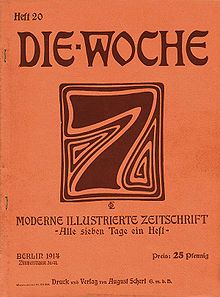Die Woche ([dɪ ˈvɔxə], 'The Week') was an illustrated weekly newspaper published in Berlin from 1899 to 1944.
 Front page of issue 20, 1914. | |
| Type | illustrated weekly newspaper |
|---|---|
| Publisher | August Scherl Verlag |
| Founded | 1899 |
| Language | German |
| Ceased publication | 1944 |
| Headquarters | Berlin |
Overview
editDie Woche reported on popular entertainment, including "sensationalist crime stories", and covered celebrities in sports and show business.[1] Its publisher was newspaper magnate August Scherl,[2] who also owned the Berliner Lokal-Anzeiger, a Berlin paper.[3]
By 1916, Scherl had been bought out by the (politically conservative) Hugenberg Press, and Die Woche came to play a part in the politics of the day, specifically in promoting an image of Paul von Hindenburg as both a military man and a civilian, aiding his appeal across the German population.[1]
A Turkish weekly magazine, Yedigün, was inspired by Die Woche.[4] Between 1993 and 2002, the title Die Woche was used for a completely different kind of weekly newspaper.
References
edit- ^ a b Goltz, Anna von der (2009). Hindenburg: Power, Myth, and the Rise of the Nazis. Oxford UP. pp. 150–53. ISBN 9780191610042.
- ^ Wilke, Jürgen (2002). Unter Druck gesetzt: vier Kapitel deutscher Pressegeschichte. Köln/Weimar: Böhlau. p. 33. ISBN 9783412170011.
- ^ Welch, David (2000). Germany, Propaganda and Total War, 1914-1918: The Sins of Omission. Rutgers UP. p. 49. ISBN 9780813527987.
- ^ Sinan Niyazioğlu (2019). "Socialist Realist or Republican Nationalist? Two Faces of Art Deco on Turkish Popular Magazine Covers (1930-1939)". InfoDesign: Revista Brasileira de Design da Informação. 16 (2): 272. doi:10.51358/id.v16i2.729.
Bibliography
edit- Dahrendorf, Ralf (2000). Liberal und unabhängig. Gerd Bucerius und seine Zeit (in German) (2nd ed.). Munich: C. H. Beck. ISBN 9783406464744.
External links
edit- Advertisement for Die Woche Zentral- und Landesbibliothek Berlin 1900